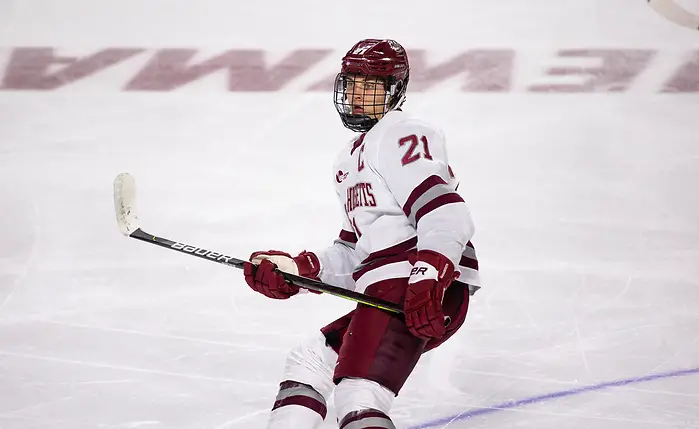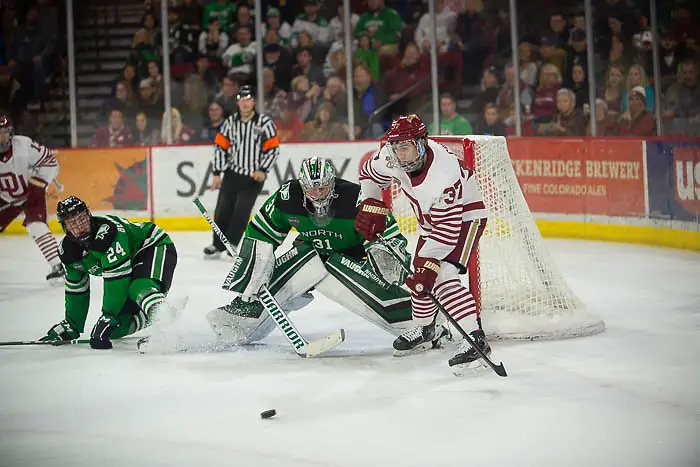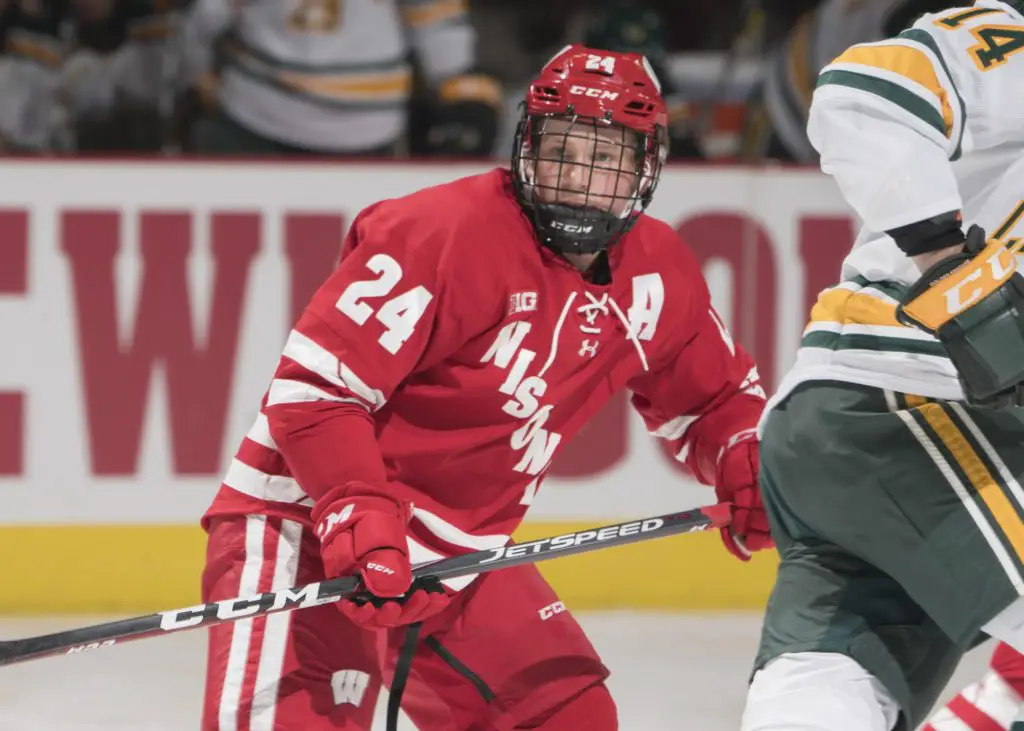
Women’s Division I College Hockey: Cornell’s Doug Derraugh named USCHO Coach of the Year

MIAC chooses Gustavus blueliner Vrieze as women’s hockey Elite 22 award winner for ’19-20
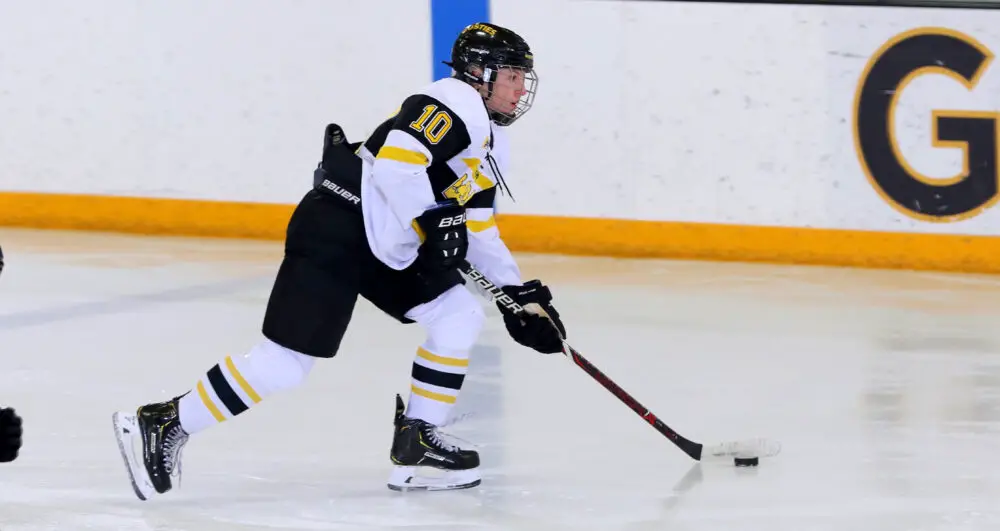
The MIAC has named Gustavus sophomore defenseman Kayla Vrieze the 2019-20 Elite 22 award winner for women’s hockey.
Vrieze played in 27 games this season, accumulating three goals and three assists for six points.
She boasted a plus-12 rating and had one game-winning goal, in the MIAC semifinal playoff win over Saint Mary’s on Feb. 29.
Vrieze is a public accounting major at Gustavus with a 3.98 GPA.
She was a key contributor this season on a team that won both the MIAC regular-season and playoff championships.
The MIAC Elite 22 Award is presented to the individual with the highest GPA on the active roster at the MIAC playoff championship contest.
Ten semifinalists announced for 2020 Mike Richter Award as top goalie in D-I men’s hockey
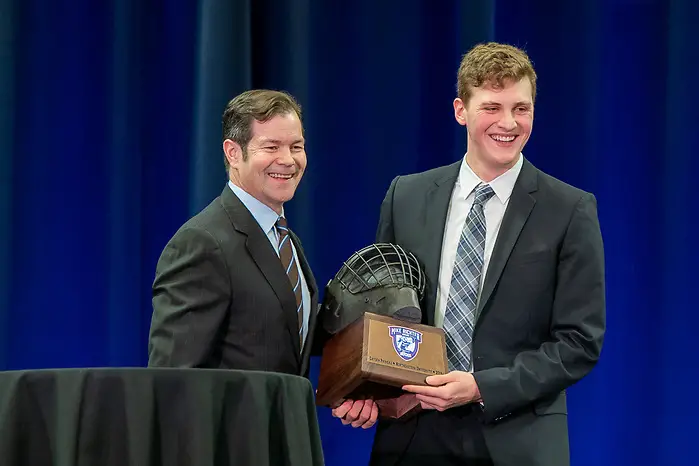
The 10 semifinalists for the 2020 Mike Richter Award were announced Tuesday.
The award is given to the top goaltender in Division I hockey and is named after Mike Richter, the former Wisconsin goalie and 1994 Stanley Cup winner with the New York Rangers.
2020 MIKE RICHTER AWARD SEMIFINALISTS
Zach Driscoll, Jr., Bemidji State
Matt Galajda, Jr., Cornell
Spencer Knight, Fr., Boston College
John Lethemon, Sr., Michigan State
Strauss Mann, So., Michigan
Frank Marotte, Sr., Clarkson
Dryden McKay, So., Minnesota State
Hunter Shepard, Sr., Minnesota Duluth
Jeremy Swayman, Jr., Maine
Tyler Wall, Sr., UMass Lowell
The award winner will be announced April 10, but due to the uncertainty of the COVID-19 outbreak, a site and time have not been determined.
Candidates for the award were determined by nominations from all 60 NCAA Division I men’s coaches.
The finalists and winner are selected by a committee of coaches, scouts and members of the media.
Past winners include Cayden Primeau (Northeastern, 2019), Cale Morris (Notre Dame, 2018), Tanner Jaillet (Denver, 2017), Thatcher Demko (Boston College, 2016), Zane McIntyre (North Dakota, 2015), and Connor Hellebuyck (UMass Lowell, 2014).
Minnesota Duluth’s Perunovich, Shepard, North Dakota’s Poolman earn individual awards from NCHC
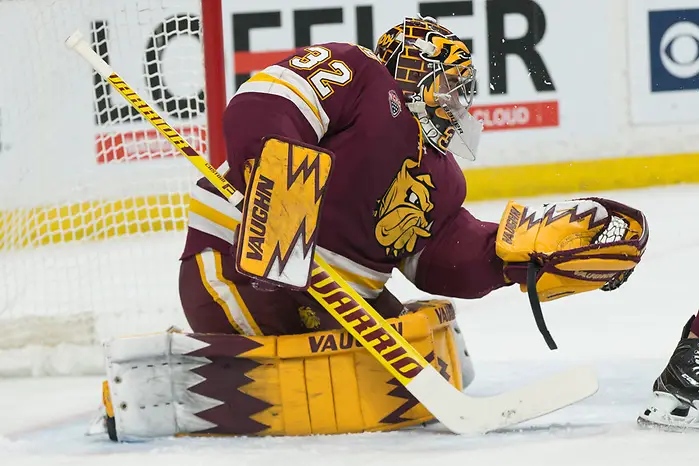
A pair of Minnesota Duluth standouts have repeated as NCHC individual award winners in 2019-20, while North Dakota senior defenseman Colton Poolman also received league recognition on Tuesday.
UMD junior Scott Perunovich won NCHC Offensive Defenseman of the Year for the third time in as many years, becoming the first NCHC player to win any year-end individual award three times. His teammate, senior Hunter Shepard, garnered NCHC Goaltender of the Year for a second straight season.
Poolman was named 2019-20 NCHC Defensive Defenseman of the Year, joining his older brother, Tucker (2016-17), as the only other Fighting Hawk to win the award.
A finalist for NCHC Player of the Year (announced Thursday), Perunovich, also a St. Louis Blues draft pick, became the first defenseman to win the NCHC scoring title, racking up 32 points in 24 conference games, including an NCHC-best 28 assists.
Perunovich ranked second nationally in defenseman scoring with 40 points (six goals, 34 assists) overall this season.
Shepard becomes the second netminder to capture NCHC Goaltender of the Year twice, joining Denver’s Tanner Jaillet in 2017 and 2018.
An undrafted free agent, Shepard was the only goaltender to start all 24 conference games this season, going 17-5-2 with one shutout (Nov. 23 vs. Colorado College). His 17 wins led the NCHC, while his .923 save percentage and 2.13 GAA both ranked second in conference play.
On the season, Shepard finished 22-10-2 overall, starting every game and breaking the NCAA record for consecutive starts, while posting a 2.18 GAA and a .918 save percentage.
Poolman, who signed with the Calgary Flames on March 20, played in 21 conference games this season, blocking 26 shots while posting a plus-9 plus/minus. Offensively, he chipped in 10 points (two goals, eight assists) in conference games and led the Fighting Hawks to the Penrose Cup as regular-season champions.
On Wednesday, the NCHC will announce Forward, Defensive Forward and Rookie of the Year. Then on Thursday, NCHC Player of the Year, Herb Brooks Coach of the Year and Senior Scholar-Athlete will be announced.
Women’s Division I College Hockey: Clarkson’s Gabrielle David named USCHO Rookie of the Year

After taking Cornell to 28-2-3 season, Derraugh repeats as national women’s hockey coach of the year
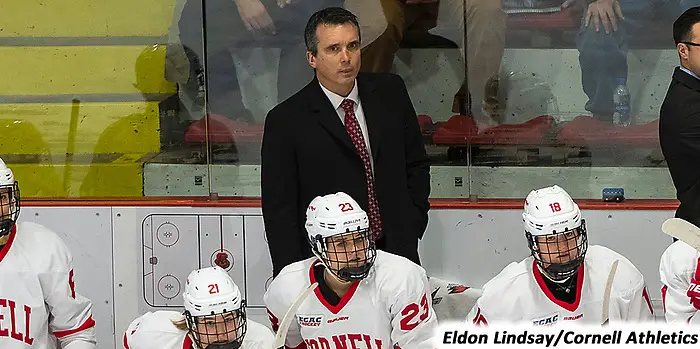
For leading his team to the ECAC Hockey regular-season title and the top seed of the cancelled NCAA tournament, Cornell’s Doug Derraugh is the CCM/AHCA Women’s National Collegiate Coach of the Year.
It is the third such honor for Derraugh, who was previously recognized in 2010 and 2019.
Cornell finished with a record of 28-2-3, (19-0-3 ECAC Hockey). The Big Red forged a 22-game unbeaten streak that began on Nov. 30 and ran through March 7.
Statistically, the Big Red averaged 3.9 goals scored per game and allowed an average of 0.9 goals per game.
Derraugh won his fifth ECAC Coach of the Year award this season.
Through 15 years in Ithaca, Derraugh has compiled a career record of 295-151-45. This season marked the fifth time he has led Cornell to the NCAA tournament — the first as the top seed.
A 1991 graduate of Cornell, Derraugh was assisted this season by Edith Racine, Dean Jackson and Louise Derraugh.
The runner-up for this year’s award is Northeastern’s Dave Flint.
The award is sponsored by CCM and the winner chosen by members of the American Hockey Coaches Association.
Northeastern has three players, Clarkson, Cornell, Ohio State, Wisconsin two each among 2020 women’s hockey All-Americans
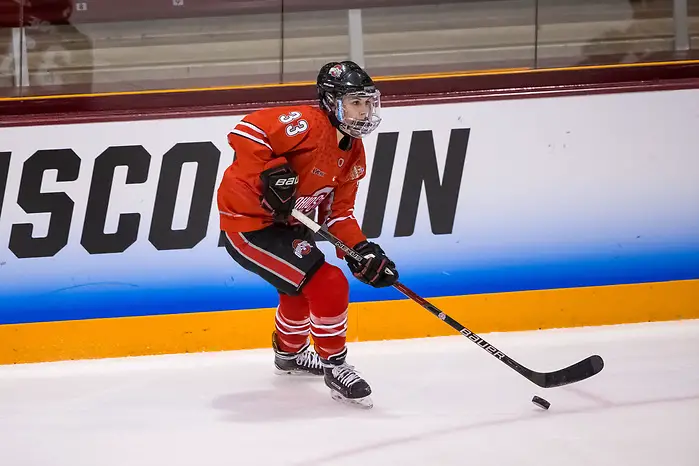
The top 12 women’s hockey players in the nation have been recognized as 2019-20 CCM/AHCA All-Americans.
Five selections come from ECAC Hockey, four from the WCHA and three from Hockey East.
The three forwards on the first team – Elizabeth Giguere, Alina Mueller and Abby Roque – are the three finalists for the 2020 Patty Kazmaier Award.
FIRST TEAM
F: Elizabeth Giguere, Jr., Clarkson
F: Alina Mueller, So., Northeastern
F: Abby Roque, Sr., Wisconsin
D: Jaime Bourbonnais, Sr., Cornell
D: Jincy Dunne, Sr., Ohio State
G: Aerin Frankel, Jr., Northeastern
SECOND TEAM
F: Sarah Fillier, So., Princeton
F: Emma Maltais, Jr., Ohio State
F: Daryl Watts, Jr., Wisconsin
D: Skylar Fontaine, Jr., Northeastern
D: Ella Shelton, Sr., Clarkson
G: Lindsay Browning, Jr., Cornell
The teams are sponsored by CCM and chosen by members of the American Hockey Coaches Association.
Utica’s Gary Heenan named USCHO D-III Coach of the Year
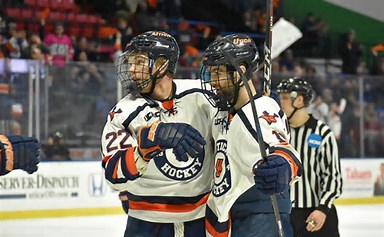
Despite the abrupt end to the college hockey season and cancellation of the NCAA tournament, Utica and their head coach Gary Heenan can take great pride in the many achievements of their team this season despite some early challenges and team chemistry changes. Heenan led the Pioneers through those challenges on the way to the program’s best season including the No.1 seed in the NCAA tournament.
“It has been hard to process everything with the speed and abruptness that the season ended with before the national tournament,” said Heenan. “We literally had just a single day before having to send the kids off campus due to the coronavirus crisis. We didn’t have an opportunity to finish things on the ice like we wanted to against a talented tournament field but we can celebrate the best season in program history that included a 25-2-2 record and a record 20 consecutive wins. With the journey we had this year, those numbers didn’t seem possible at the beginning of the season.”
After a loss at Stevenson in early December, the Pioneers record stood at 5-2-2 overall and just 3-2-1 in the challenging UCHC. Heenan and his staff knew they needed a reset on the chemistry in the room and some healthy returns of veteran players from the injured list to get the team fully in the right direction. The loss against Stevenson would be their last “L” of the 2019-20 campaign and the desired culture shift was embraced and adopted by all.
“We had to change a lot of things,” stated Heenan. “I give my staff and the players a lot of credit for changing the dynamic and really giving us chance to have the season we did. It was tough at the beginning and like only one other year when I really didn’t like going in the locker room – it was awkward and our leadership group was struggling. We knew we needed a reset and leveraged social media with the team to reinforce the areas of focus. They really bought in and you could see the impacts in a lot of areas. We moved to a more wide-open style of play and away from being one of the most penalized teams. We got some players back like [Gianluca] Baggetta and [Conor] Landrigan who had big impacts on the ice and in the room. We won 20 games in a row and just got better and better as the season progressed.”
The amazing win streak helped the Pioneers win the regular season title in the UCHC; win the conference tournament with two-game sweeps of Nazareth and Wilkes in the semifinal and final round of the conference tournament and assume the No. 1 seed for the NCAA tournament where they awaited the winner of the Wesleyan v. Babson first round game in the quarterfinals.
“We would have loved to have had the chance to play it out just like all the other teams in the field,” stated Heenan. “There were some real long-term power programs in the tournament like Norwich, Geneseo, Hobart and Wisconsin-Eau Claire. It was a great field that we will never know the outcome and how we would have matched up in a strong field. It was a very tough way to end a successful season and I really feel for our four seniors who couldn’t play it out on the ice. This situation extends our off-season but we are already getting ready for next year.”
NCHC tabs Minnesota Duluth’s Roth for sportsmanship award; North Dakota’s Kawaguchi, UMD’s Perunovich, CBS Sports’ Starman also nab ’19-20 honors
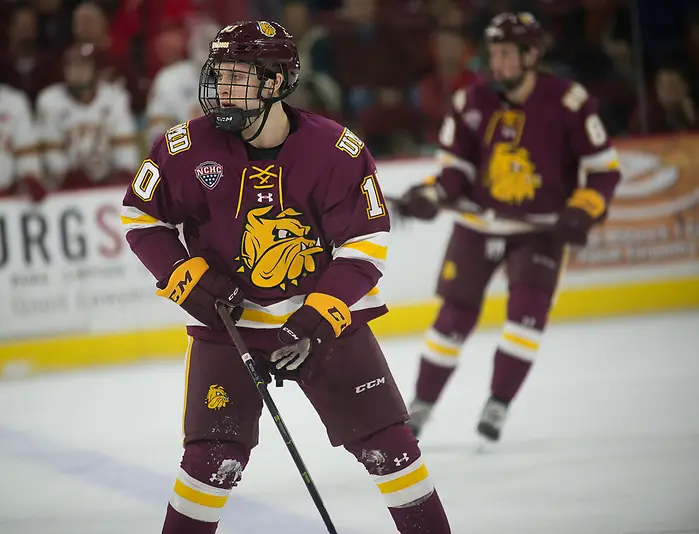
The NCHC announced Monday that Minnesota Duluth junior forward Kobe Roth is the 2019-20 Sportsmanship Award winner, while North Dakota junior forward Jordan Kawaguchi and UMD junior defenseman Scott Perunovich split the NCHC’s Three Stars Award as co-winners.
In addition, Dave Starman of CBS Sports Network was named the conference’s third annual Media Excellence Award winner.
Roth played in all 34 games for the Bulldogs this season while not committing a single penalty. He has committed only three minor penalties in his 106-game career, two of which came as a freshman, and he has never committed a major penalty.
This season, Roth scored a career-high 13 goals, part of a career-best 21 points with a plus-6 plus/minus rating.
Kawaguchi and Perunovich both earned First Star of the Game four times in conference play and both totaled 30 points in Three Stars of the Game voting (using a 5-3-1 scale) in conference games.
Starman has become synonymous with the NCHC, as the CBS Sports Network color analyst has been a stalwart on league broadcasts since the conference began play. Starman was on the call for the NCHC’s first-ever conference game, which aired on CBS Sports Network from Oxford, Ohio, on Oct. 18, 2013.
A fan favorite and passionate advocate for the NCHC, Starman puts in hours of work during the week watching and analyzing games and preparing for broadcasts. Once on site, he interviews several players and coaches to complement his already vast knowledge. In addition, he has attended several NCHC Media Days, conducting interviews and gathering background information for the season.
Starman has been broadcasting college hockey games for a total of 16 seasons, dating back to CSTV (precursor to CBS Sports Network) in 2003-04, while also serving as a scout in the NHL for multiple teams over the years.
Along with play-by-play announcer Ben Holden and rinkside reporter Shireen Saski, Starman helps make up one of the best broadcast teams on television.
On Tuesday, the NCHC will announce both Offensive and Defensive Defenseman of the Year and Goaltender of the Year, while Wednesday the conference will award Forward, Defensive Forward and Rookie of the Year. Finally, on Thursday, NCHC Player of the Year, Herb Brooks Coach of the Year and Senior Scholar-Athlete will be named.
Concordia (Minn.) standout Bossert garners MIAC Elite 22 award for 2019-20 season
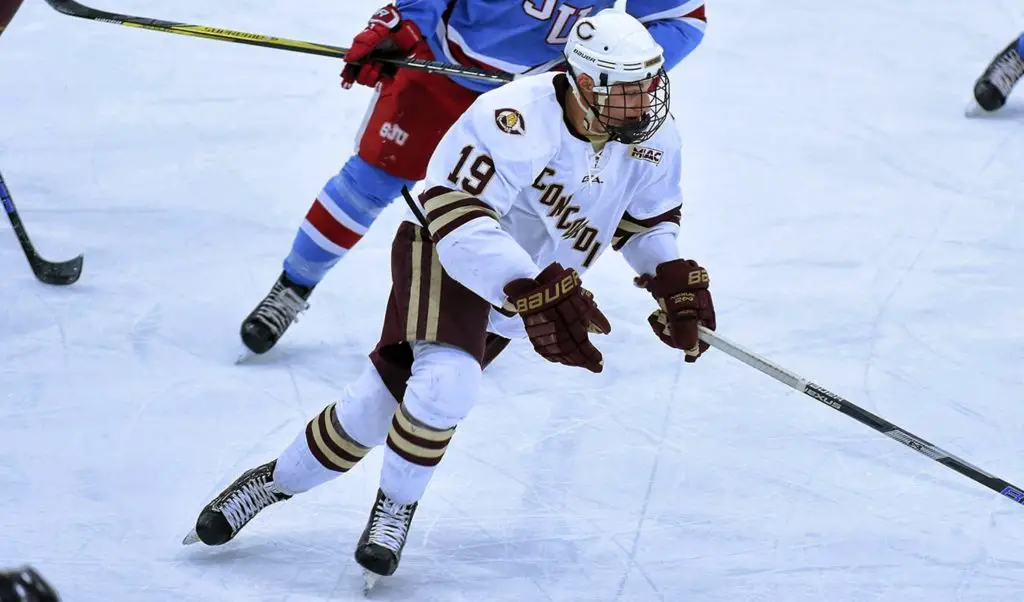
Concordia (Minn.) junior forward Tyler Bossert has been named the winner of the MIAC Elite 22 award for academic excellence in men’s hockey.
In all sports with MIAC team postseason tournaments, the MIAC Elite 22 Award is presented to the individual with the highest GPA on the active roster at the MIAC playoff championship contest. The recipient must be a sophomore, junior or senior and in at least his or her second season of competition with their current team.
Bossert carries a 3.98 GPA while majoring in business. He also helped Concordia advance to the championship of the MIAC postseason tournament. The Cobbers finished the year with a 14-11-2 overall record and placed second in the conference standings with a 10-5-1 mark. The 10 league wins are the most since 2013.
The award comes on the heels of Bossert being named to the MIAC All-Conference Team for the second straight season. He led the team in scoring for the second straight year, putting up six goals and 21 assists for 27 points in 2019-20.
Winner of 2020 Patty Kazmaier Award to be revealed March 27 on USA Hockey social media channels
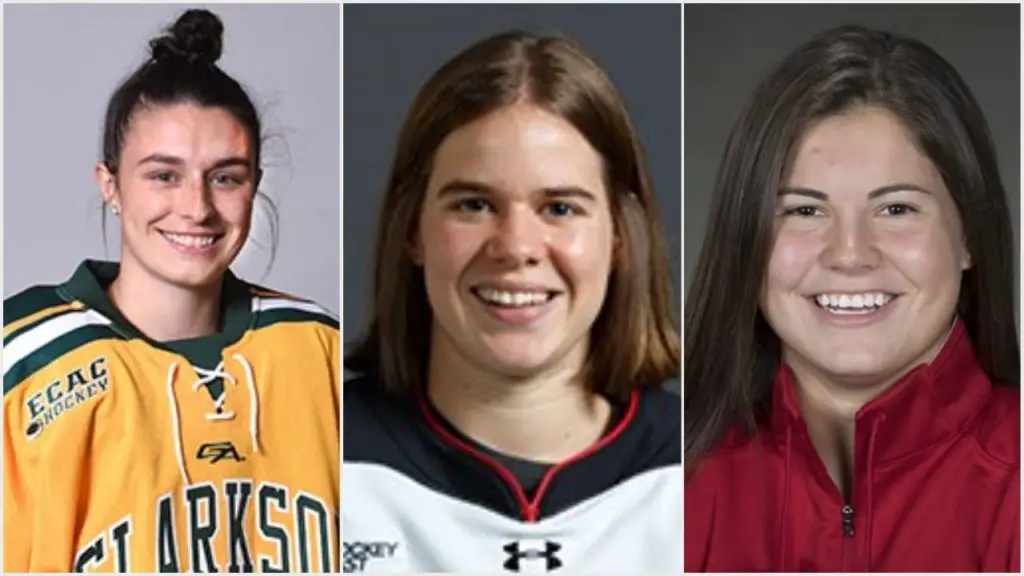
USA Hockey announced Monday it will reveal the winner of the 2020 Patty Kazmaier Memorial Award on Friday, March 27, at 1:30 p.m. EST.
An award of The USA Hockey Foundation, the award is presented annually to the top player in NCAA Division I women’s hockey.
USA Hockey will utilize the premiere feature of both its Facebook and YouTube channels to share highlights of the top 10 finalists for this year’s award as well as unveil the winner.
Clarkson junior forward Elizabeth Giguere, Northeastern sophomore forward Alina Mueller and Wisconsin senior forward Abby Roque are the top three finalists for the 2020 honor.
USA Hockey canceled the formal Patty Kamzaier Memorial Award brunch and ceremony that was scheduled for March 21 in Cambridge, Mass., on March 13 due to the coronavirus pandemic.
Cornell finishes 2019-20 season with No. 1 ranking in USCHO.com Division I Men’s Poll
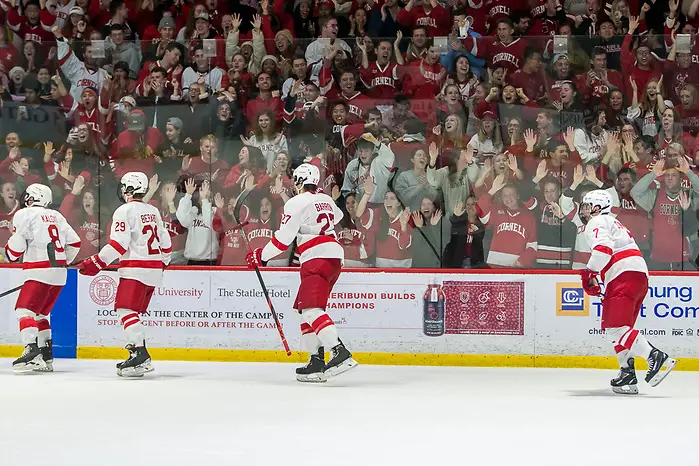
After a season that abruptly ended almost two weeks ago, Cornell finishes the year ranked No. 1 in the final USCHO.com Division I Men’s Poll of the 2019-20 season with 25 first-place votes.
Second-ranked North Dakota (16), No. 3 Minnesota State (6), No. 4 Boston College (2) and No. 5 Minnesota Duluth (1) get the rest of the first-place votes in this week’s poll.
Denver, Clarkson, Penn State, Massachusetts and Ohio State finish out the top 10, respectively.
USCHO.com Division I Men’s Poll – March 23, 2020
Rankings 11 through 20 are the same as the March 9 poll: Bemidji State, UMass Lowell, Arizona State, Quinnipiac, Maine, Western Michigan, Michigan, Minnesota, Northeastern and American International, in that order.
In addition, 10 other teams received votes.
The USCHO.com Poll consists of 50 voters, including coaches and beat writers and sports professionals from across the country.
This (last) Week in NCHC Hockey: With season shuttered, teams devastated, Denver’s Carle says ‘game is fragile,’ ‘can be taken from you at any moment’
On the morning of March 12, I got a text from Matthew McGreevy, assistant director of athletic communications at Denver.
He simply asked, “Are you planning on coming if we play this weekend?”
At that time, the plan was still for the NCHC tournament to hold its quarterfinal games sans spectators, and then do the same for the Frozen Faceoff in St. Paul, Minn., an announcement the conference made on March 11.
That was the first I’d heard that the games might not be played. The previous evening, the Utah Jazz had announced that Rudy Gobert tested positive for COVID-19, and the NBA immediately announced it was canceling its season.
The NBA announcement seemed to be the tipping point, what other sports were looking at. Within 45 minutes of receiving that text from McGreevy, the cascade started, rapidly picking up speed. The NCHC and other college hockey conferences announced they would be canceling their tournaments.
Two hours later, the NHL announced it was suspending its season. By late afternoon, the NCAA had suspended all athletic competitions, including the basketball and hockey tournaments.
College hockey season was abruptly over.
“We were meeting as administrators and talking with the league; I think it was decided the morning of the 12th that we were going to cancel the NCHC tournament,” said Denver coach David Carle. “From there, I met with the team before practice and informed them of that. We decided that we would still get on the ice. I think the mood was pretty somber, and I think we all felt like more could come from it, more cancellations could come. I think the night before the NBA had decided to postpone their season. So, I think we were all cautiously optimistic, but realistic at the same time.”
Carle explained how the day went from there.
“Anyway, we went out on the ice,” said Carle. “We decided to try to have some fun and get their minds off things. We played a three-on-three cross-ice tournament, and then we came back in the room and saw on Twitter that the NCAA canceled spring and winter championships. From that point, we went into the locker room. The guys were all in from practice and we shared the news.
“It was pretty emotional for everybody to think that this is how our season ends. Obviously, we’re not the only ones in this situation, and people are going through a lot harder things then having to deal with the sports season being over. But you feel for our seniors, who came in as national champions, won as freshmen, and certainly had every intention of leaving in the same manner in Detroit.”
In a conference call that afternoon, NCHC commissioner Josh Fenton stated, “Certainly, we’re living in unprecedented times. This is certainly not a light decision in any way, but ultimately the health, safety and security of our student athletes, our officials, our media, our fans, our staff members, anybody involved within games being played on our campuses or a neutral site in Xcel Energy Center was our highest priority. The decisions that were made over the course of the past 24-36 hours were focused on that priority being front and center.”
It’s interesting to consider the impacts on the NCHC Frozen Faceoff as well.
Denver is the only team to make the tournament finals every year of the league’s history and was excited to do so again, hosting Omaha in the first round. Minnesota Duluth was the defending Frozen Faceoff champion and would be a tough out. North Dakota was looking to win its first-ever NCHC Frozen Faceoff by returning to St. Paul after missing it in 2019. Western Michigan would need to keep its NCAA hopes alive by defeating a red-hot St. Cloud State team.
The tournament had many interesting subplots.
“We were expecting, I think, two or three really good hockey games,” said Carle of the Omaha series. “I think they’re a team that was young and was showing a lot of growth and progress throughout the year. I think they had just split with North Dakota the previous weekend. So, they were coming in with some confidence. At the same time, we were excited to play playoff hockey, and I think that’s what everybody works toward throughout the year. You go through the ups and downs to have the opportunity play in the most fun time of the year.
“Our guys were excited, and we felt good about our chances and obviously we’re disappointed that we and many others weren’t able to continue playing.”
Omaha was in Denver preparing for the series when the cancellation was made, and the team faced a long bus ride back.
Said Omaha senior Ryan Jones in an interview with the Omaha World-Herald: “It was kind of surreal. I knew it was my last trip with the team, and it seemed like it took us forever to get home.”
Fenton later tweeted on the cancellation:
Words can't describe the experience of the past 2 days. The health/safety of all involved were/are the highest priority. I'm saddened for our student-athletes who pour their hearts into our great game. I'm disappointed for our fans who love @TheNCHC. We will be back #NCHCFamily! pic.twitter.com/HCabwvaCYG
— Josh Fenton (@Fenton_JC) March 13, 2020
For the league, it was the end of the chance to match the WCHA’s run of five consecutive national championships in the early 2000s, a feat the WCHA also had from 1973 to 1977. The NCHC was well-positioned for a fifth straight national championship. North Dakota, which started the run of four championships in 2016, was the top seed in the PairWise. Two-time defending national champion Minnesota Duluth had eliminated its bouts of inconsistency and looked poised for another run. Denver had a solid season and was ranked fifth in the PairWise.
On the outside looking in was Western Michigan, which was 18th in the PairWise. However, the Broncos had been playing excellent hockey in the second half, and a run to the NCHC Frozen Faceoff might have lifted them into the NCAA tournament as well.
In an interview with the Duluth News Tribune right after Fenton’s announcement, Minnesota Duluth coach Scott Sandelin said, “You see what’s transpired. I’m not totally surprised what happened, but certainly frustrated. I feel for our players, certainly our seniors. You can’t control what you can’t control. It’s unfortunate, but that’s the way it is. It’s probably confusing for a lot of guys because there is not a lot of closure.”
Said UMD senior Jade Miller to the Duluth News Tribune: “It was pretty surreal. It happened so abruptly. You’re thinking you have a couple more games back here in Duluth in front of family and friends. It’s tough knowing you played your last game when you didn’t know it was your last game.”
DU’s seniors are already home and taking part in classes remotely. DU will likely finish its academic year with only online classes. Colorado has been aggressive with shutting down public gatherings.
As part of social distancing measures, Colorado Governor Jared Polis suspended the ski season for a week on March 14, later extending it until April 6. He also shut down public schools until April 17, and later shut down all bars and restaurants. Restaurants are still able to offer to-go and delivery but are not allowed to seat customers.
Vail Resorts later announced that all but three of its resorts would shutter operations for the year, and most Colorado ski areas have done the same. Two or three might try to reopen in May, if conditions allow.
DU is not the only university that is shuttered. The University of Colorado and Colorado State University have also moved all classes online.
“My guess is they’ll keep it remote,” said Carle. “It was initially going to be remote until April 10 with a re-evaluation on March 31, and they made the decision sometime earlier this week that it was going to go fully online. I don’t see them coming back from that.”
Before the seniors left campus, Carle and the coaches met with them, and says there are lessons to be learned from the experience.
“Yeah, we met with each of them just real briefly as everyone was leaving town on Friday and booking flights, and your heart goes out to them,” Carle said. “I think the lesson to be learned, or one of the many, is life’s a fragile thing. Our game is fragile, and it can be taken from you at any moment. So, enjoy it, appreciate it, and be grateful that you get to do it.
“Any chance you get to put the skates on and go on the ice, have a sense of gratitude that you get to go out and play a game.”
Aubrun from Norwich named USCHO D-III Player of the Year
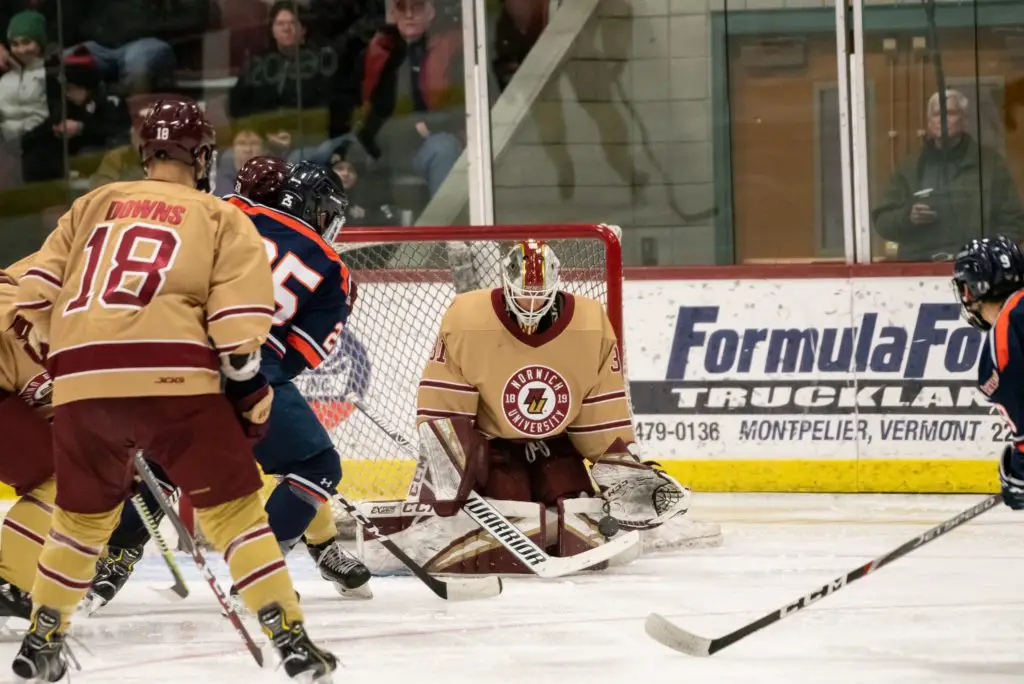
Every so often there is a season and individual statistics amidst the trappings of the ultimate team sport that are truly astounding at every level. Such is the case for USCHO Player of the Year Tom Aubrun who completed his senior season for the Cadets riding a nine-game shutout streak and posting 13 shutouts overall for the No. 1 ranked team in the nation. Aubrun’s 0.77 goals-against average and .967 save percentage far and away led the nation as he started in 27 of 28 games for Norwich.
“Tom has been a pleasure to coach,” noted former goaltender and head coach Cam Ellsworth. “He is just a humble kid that comes to the rink everyday working hard and wanting to be better each and every time on the ice. He has a terrific work ethic and discipline and is tremendously competitive. I thought he had a terrific season last year when we advanced to the national championship game but he was even better and more consistent this year.”
With an overall record of 23-2-2 and a conference record of 15-1-1, Aubrun showed the consistency his coach describes with a 0.76 GAA and .976 SP with nine shutouts in the highly competitive NEHC. His season long excellence earned him both the Goaltender and Player of the Year Awards as he closed out his career with 50 wins in 65 games played at Norwich.
“It’s really a wonderful thing to see a player like Tom and his humility recognized for such a great season,” said Ellsworth. “I have never been a part nor seen anything like this unprecedented shutout streak. You never go into a game saying let’s go get a shutout, you want the team and your goaltender to stay in the moment and just play the best they can. Tom, with all of his success never changed his work level, and truly stayed in the moment even as the streak and pressure with that continued to grow. He really is that humble kid who is a terrific teammate all while he has pretty much re-written the record book here at Norwich with his play this season and last. One of the regrettable things about the abrupt end to the season is we don’t know how much longer he could have pushed the streak.”
Aubrun is considering a number of options for continuing his hockey career at the professional level when hockey resumes in the post-corona
virus timeframe.
“Tom has always focused on being better and I think he has not found anywhere near his ceiling as a player,” noted Ellsworth. “Based on what I have seen from him, I expect he will have great success at the next level.”
BRACKETOLOGY SIMULATION: Here is how we break down the brackets for the simulated 2020 Men’s Division I hockey tournament
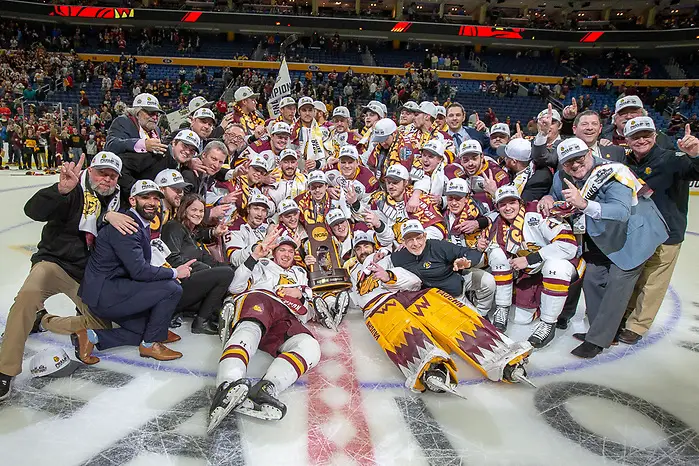
Thanks to the efforts of USCHO message board participant ‘Fighting Sioux 23’, USCHO has been running simulations of all of the conference quarterfinal, semifinal and championship that were canceled due to COVID-19.
From that, we created the final PairWise Rankings to produce an NCAA tournament field. And after that, seeded the tournament based on Bracektology, the long-time product of Jayson May and USCHO.
Please note this is just a simulation. These games will never be played. But ‘Fighting Sioux 23’ has agreed to simulate these games and produce results for each of the 15 simulated NCAA tournament games.
Here is the bracket for the simulated Division I NCAA Tournament:
Albany Regional (Sat. & Sun.)
1 North Dakota
8 Clarkson
9 Massachusetts
16 Sacred Heart
Loveland Regional (Sat. & Sun.)
4 Minnesota-Duluth
5 Denver
11 Maine
13 Ohio State
Allentown Regional (Fri. & Sat.)
3 Minnesota State
7 Penn State
10 Mass.-Lowell
14 Western Michigan
Worcester Regional (Fri. & Sat)
2 Cornell
6 Boston College
12 Bemidji State
15 Michigan
If we lay out the brackets with full bracket integrity, here is what we get after making a swap of Maine and Bemidji State in order to avoid an intra-conference matchup.
1 North Dakota
8 Clarkson
9 Massachusetts
16 Sacred Heart
2 Cornell
7 Penn State
10 Mass.-Lowell
15 Michigan
3 Minnesota State
6 Boston College
12 Bemidji State
14 Western Michigan
4 Minnesota-Duluth
5 Denver
11 Maine
13 Ohio State
Now we look at who has to go where. Therefore, we placed Cornell in Allentown because of Penn State and Minnesota-Duluth in Loveland because of Denver. Then North Dakota is sent to Albany and Minnesota State to Worcester.
Albany
1 North Dakota
8 Clarkson
9 Massachusetts
16 Sacred Heart
Allentown
2 Cornell
7 Penn State
10 Mass.-Lowell
15 Michigan
Worcester
3 Minnesota State
6 Boston College
12 Bemidji State
14 Western Michigan
Loveland
4 Minnesota-Duluth
5 Denver
11 Maine
13 Ohio State
Let’s start by looking at some of these placements. Cornell in Allentown is not that bad, it is 180 miles from Ithaca to Allentown. It is only 167 miles to Albany. So not much of a difference there. we can live with that.
But the biggest problem for us is the Worcester regional. It is going to have tremendous attendance problems with Boston College being the only team close to this regional.
But it ís also part of the fact that there isn’t much else you can do to pull in closer teams to this regional, with all Hockey East schools in the third band except for Boston College.
So what do we do?
The easiest thing for me to do would be to switch Cornell and Minnesota State, along with their opponents.
Albany
1 North Dakota
8 Clarkson
9 Massachusetts
16 Sacred Heart
Allentown
3 Minnesota State
7 Penn State
10 Mass.-Lowell
14 Western Michigan
Worcester
2 Cornell
6 Boston College
12 Bemidji State
15 Michigan
Loveland
4 Minnesota-Duluth
5 Denver
11 Maine
13 Ohio State
And there you have it. What we think the simulated NCAA Tournament looks like.
This (last) Week in Big Ten Hockey: With season cancelled early, coaches want to move on, ‘slow down a little bit’
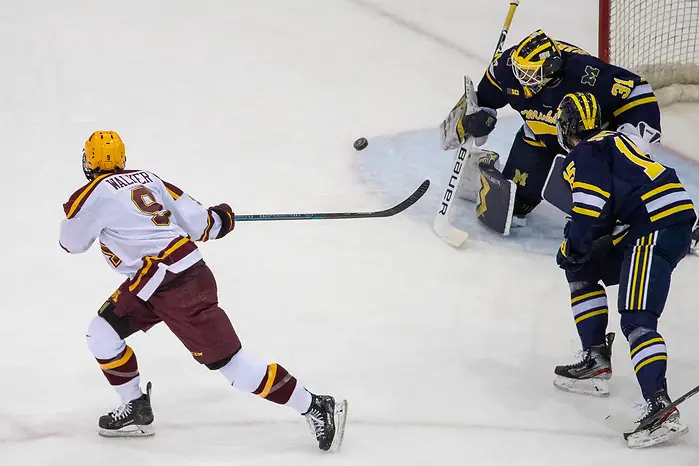
Among the many ways to process a season ended by a global pandemic, perhaps the most unexpected is with optimism.
“It’s like we’re all living in a movie. This is crazy. But what can you do? I’m always a glass-half-full guy,” said Michigan coach Mel Pearson. “We’ll move forward and we’ll get everybody through it, hopefully. Maybe it’s nice to slow down a little bit. We’re so busy. We’re so caught up in everything.”
Five days after learning that the season was over for everybody, the Michigan coach was putting things into perspective.
“I am more encouraged by being around the people that we have and even in all of college hockey,” said Pearson, who emphasized how much he’s enjoying coaching this current generation of players.
“I can’t speak for other sports,” said Pearson, “but in college hockey in general, the young people we have that are going to grow up and be leaders in our communities and all over – we’ve got some very special, special, special people.”
Minnesota’s Bob Motzko said, “In the big picture of it, our guys are great. The real question is, what do we do now? I think over the next two weeks, we’re all going to have to figure that out. It is going to pass. Life is going to get back to normal at some point, but what do we do now until then? That’s what we’re all trying to figure out.”
The what-to-do-now part of it is something that propels the four coaches of teams still viable in the Big Ten tournament when the NCAA announced that the season was over. Penn State was set to host Minnesota and Michigan would have traveled to play Ohio State.
“We’ve got to take this thing seriously,” said Ohio State’s Steve Rohlik. “The better we do that, the sooner we can, hopefully, get back to normality, whenever that might be.”
And whatever “normal” might be. There is so much that cannot be planned right now.
“Everything’s on hold – recruiting, everything,” said Pearson. “We’re just trying as much as we can to talk about the year, keep the players informed of what’s going on. There are still so many questions. Just try to come up with a plan for spring and summer, given the information we know.”
Coaches are cautioned to practice the same social distancing that the rest of us are encouraged to do.
“I haven’t seen my staff now in three days or four days,” said Motzko. “I’m starting to see my family all the time. That’s different – not only different for me, but I’m sure it’s very different for my family as well. Every week, we’re all going to have to circle back together to see how everything’s going. It’s going to be new and different for every one of us.”
Motzko said that everyone’s really waiting for direction.
“Our leaders above us – whether it’s in our university, NCAA, Big Ten office – they’re going to have to take a break and follow this and we’re going to take direction from them,” said Motzko. “In the meantime, it’s make sure all our players are safe, they’re at a place where they’re comfortable. Last week was Week Zero. This is Week One.”
This ability to move forward doesn’t mean that recent events haven’t been, as one coach put it, crushing. Both the Wolverines and the Golden Gophers were on the bubble of the PairWise Rankings, but Penn State and Ohio State were certain to advance to the NCAA tournament.
For the Nittany Lions – a team with 10 seniors – the ending was particularly keen because Penn State was anticipating a return to play after earning a first-round playoff bye and after their regular season ended with a bye week.
“We were just really excited and looking forward to playing for everything that the Big Ten tournament was going to bring,” said Penn State coach Guy Gadowsky. “We were fortunate enough to know that we were already going to be in the NCAA tournament, so boy, every day was great because it was just very, very exciting.”
Gadowsky said that his senior class is “very, very close” and that they were wanted to end their time at Penn State by making a statement.
“Their freshman year, they won the Big Ten tournament when, at the time, Penn State was still supposed to be not very good,” Gadowsky said. “I think they wanted to prove that that wasn’t a fluke. They all stayed together and they’ve worked extremely hard to get back to the tournament and to go a lot further, and they really thought they could do that. I really feel for them.”
The eight-member Ohio State senior class was poised to do something that no other class had done in Buckeye hockey history — make a fourth consecutive trip to the NCAA tournament. This class also is the second in history to have earned 20 or more wins each of its four years.
“They believed in us enough here to come to Ohio State, to believe in what we’re doing here and believe in our culture, to believe that we can compete and win on a night in-night-out basis,” said Rohlik. “This group blended in, carried on the culture from their freshman year on to leading this year. I give them credit for carrying on what we thought we could do here and the program’s in a better place now than when they got here.”
Pearson said that telling his players that their season was over without getting to play another game was one of the hardest things he’s ever had to do as a coach.
“It was an emotional room,” said Pearson. “We have nine seniors. The thing is, they felt really good about where we were and our chances and our opportunity. It’s not like you’re going in there telling a team that’s got no chance or talking to a team whose season was already over. It’s totally different. It was hard.
“All you can do at that point is thank them, tell them that you love them, and that when they look back this will be a minor setback in the big picture of things for them. I told them to stick together and that’s about it. Still, I think the words ring shallow.”
Motzko said that once it was revealed that Rudy Gobert of the Utah Jazz had been diagnosed, “everyone expected” things to change rapidly but that “when the final word came down, I only have three seniors, but it was really the look on their faces that was the hardest. I think the rest of our team is so young and their time, I think they know their best time is to come that they’re more able to handle it.”
All four coaches talked about getting caught up on hockey-related things that they’ve been putting off, like reviewing tape, tweaking systems, gathering information and consulting with others – from a safe distance.
“Like a lot of coaches, I’ve got all these little projects that I’ve wanted to work on for about 10 years,” said Motzko. “I’m actually now going to hold myself accountable. There’s a lot of professional development things we can do, and we all have them. We all talk about them.”
Motzko added that there are projects at home, too. “Oh, that list has already grown, too. I’ve already been informed of that.”
Pearson said that his daughters are happy to have him around to spend time with his three grandchildren, all under the age of five. On March 16, he posted a video of a little family quality time.
At this time last night we should of been in Columbus Ohio beating Ohio State ! Bus ride 3 hours , game time 2.5 hours singing the “Victors “ awesome . Being at home with my 3 grandkids playing the piano ….Priceless ! ?
〽️GoBlue ??? pic.twitter.com/9YCucH0KGV— Mel Pearson (@CoachPearsonUM) March 16, 2020
“That’s what it’s all about, really,” said Pearson.
Rohlik said that he’s “just figuring it out day to day for now.”
“Everybody’s safety is the top priority,” said Rohlik. “We just happen to be involved in the sport thing.”
And that sports thing is what everyone will get back to when hockey resumes, and it will, said Motzko. “I couldn’t believe not having a season next year. There’s too many good people, too many smart people who can figure this out.”
In the meantime, said Motzko, forward-looking is the only way to be. “I think all of us, we have to create a new world to be busy and productive. We can’t do nothing, That doesn’t work.”
One good kid among many
This week, I put out the word that I would like to get the perspective of the seniors from the four B1G teams that were still playing when the NCAA announced the end of the season, but so many of them had scattered that it was nearly impossible to do so.
It was a great stroke of luck, then, to get a call from Jake Slaker, the Michigan senior forward and assistant captain from Chicago.
“Honestly, it’s still doesn’t even feel real,” said Slaker. “It’s like such a weird feeling.”
Slaker, an undrafted player, finished his season with 14 goals and 17 assists in 33 games, one goal short of his career-best 15 in 40 games during his sophomore year. He was riding a four-game point streak into the Big Ten semifinals, including two goals in quarterfinal action against Michigan State, one of them a game-winner.
All of that now is history.
Still in Ann Arbor, Slaker is figuring out his next step. He has a semester to finish online, as Michigan is one of the many colleges and universities that is shifting to a virtual classroom in an attempt to contain the spread of COVID-19. It’s the first time in his life that he’s been just a college student, with no hockey competing for his attention.
“I kind of feel like I’m unemployed right now,” he said.
He was joking a little, but it’s an accurate statement.
Like a lot of undrafted players, Slaker was looking at professional possibilities to follow the end of his collegiate career.
“If my season ended Sunday, I was planning on seeing what my professional options were,” he said. “I was hoping it would be signing a contract and starting my new journey with my new team right away. Now, you talk to your coaches and your people, and the thing is nobody knows what to do because this isn’t a normal situation. It’s kind of like a stagnant state.”
That limbo isn’t limited to hockey. Slaker called Ann Arbor a ghost town.
“You see people packing up their cars and heading home,” said Slaker. “Sports aside, all seniors don’t get the experience of the end of their last semester and graduation is cancelled. I feel so bad for my parents.”
See? Lucky. Slaker’s world as he knew it – school, hockey, plans for his profession – shifted suddenly in unimaginable ways, but Slaker said he feels terrible for his parents.
“At the end of the day, I don’t think we’d appreciate it as much as we would as if we were older, but my parents are definitely feeling that for sure,” said Slaker.
When I talked to Mel Pearson this week and he shared his optimism for our future as a whole, he pointed to Slaker’s generation.
Pearson said, “They’re bright, intelligent, they’re caring, they’re more diverse and more accepting of things. It’s awesome.”
In my conversation with him, Slaker struck me as someone who exemplifies all of that. One of the things that sticks with me is that he seemed more disappointed for Michigan as a team than for the abrupt end of his own collegiate career.
The Wolverines, he said, fully expected to be playing in Detroit April 9.
“We were playing awesome hockey,” Pearson said. “Honestly, there was not a doubt in our locker room that we didn’t think we were going to be there.”
Thank you, take care, and goodbye for now
I can’t speak to the enormity of what’s going on in the world right now.
As Guy Gadowsky told me just a couple of days ago, “I’m not equipped to think beyond right now.”
Neither am I.
I am grateful, though. That much I know.
I usually end my season by thanking people by name who have helped me along the way. These folks know who they are and know that they are in my heart.
Instead, as we face uncertainty and wrestle our anxieties, I want to tell you a story.
On Nov. 5, I tweeted out that my dad had died. It’s not something I normally would have shared, but I had published a little about his final years with Alzheimer’s because my hockey writing was something he frequently – and repeatedly – brought up with me when we talked, often with unintentionally funny and sometimes poignant results.
Many people on Twitter responded warmly with stories of their own. It was a years-long and lovely conversation. I knew people would want to know that he was gone.
The very first message I received came through social media, privately: “Love from CCHA guys.”
Those CCHA guys are current and former on-ice officials, some I’ve known for decades. That four-word message still brings tears to my eyes and reminds me that our college hockey community is one of the strongest, most loving I’ve ever encountered.
Thank you for being part of my college hockey community – my family, really.
Please be gentle to yourself. Be patient with others. Stay safe and healthy.
And wash your hands.
See you next season.
SIMULATIONS: Computer produces NoDak, Penn State, Cornell, Lowell, Bemidji St. and SHU as champs; simulated NCAA field produced
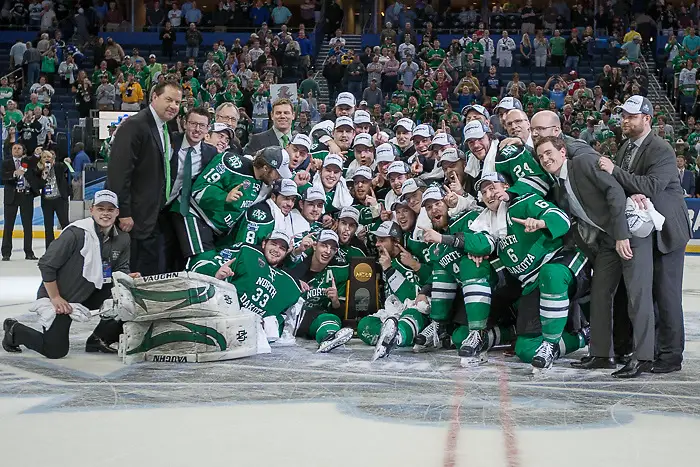
Thanks to the talent of USCHO message board member “Fighting Sioux 23” (we will withhold his actual name to protect his identity), we can present you with results from the multiple tournament championship/consolation games that would have been played on Saturday night, based on a computer simulation.
The teams participating in each championship game were also predicted using KRACH data to produce quarterfinal and semifinal winners. At the bottom of this story, we present the 16-team field for a simulated NCAA tournaments. Jayson Moy and Jim Connelly will have a simulated bracketology to produce the field for that tournament on Sunday afternoon.
Atlantic Hockey
Sacred Heart 3, Army West Point 2
After Army West Point rallied from a 2-0 deficit, Sacred Heart’s Jorden Kaplan scored a tie-breaking goal late in the third period to send the Pioneers to the NCAA tournament.
The Pioneers led 2-0 in the third until a major penalty for charging was whistled on the Pioneers where both Domenic Franco and Zach Evancho each tallied during the five-minute power play.
Big Ten
Penn State 5, Michigan 3
Aarne Talvtie’s goal late in regulation broke a 3-3 ties and Evan Barrett added an empty-netter as Penn State captured the Big Ten title, 5-3.
Despite falling behind, 1-0, early, Penn State’s potent offense roared back with goals by Sam Sternschein, Liam Folkes and Connor McMenamin to take a 3-1 lead into the first intermission.
Michigan continued to battle back throughout and tied the game on a Jake Slaker goal in the second. The game remained tied at 3 until Talvtie’s late goal became the difference maker.
ECAC
Cornell 3, Clarkson 1
Cornell avenged its overtime loss in last year’s ECAC tournament to Clarkson, jumping to an early 2-0 lead and holding on for a 3-1 victory.
Ben Berard and Morgan Barron scored early for the Big Red. But Nick Campoli shot late in the first ended up in the back of the net for Clarkson, sending the game to the first intermission with Cornell holding a 2-1 lead.
After a scoreless second frame, Alex Green’s shot from the point early in the third was the insurance goal that Cornell needed as Matthew Galajda shut down Clarkson the rest of the way giving the Big Red the title.
Hockey East
UMass Lowell 1, Maine 0
In one of the greatest goaltending duel in Hockey East tournament history, Tyler Wall earned a shutout and Andre Lee’s late goal was the only marker as UMass Lowell knocked off Maine, 1-0, to win the Hockey East title.
Maine’s Jeremy Swayman matched Wall save-for-save throughout the game before Chase Blackman won a puck battle and fed Lee who used his long reach to wrap the puck around the net on the forehand and tally the game’s only goal.
NCHC
North Dakota 4, Denver 2
North Dakota rallied from a goal down, took a 3-1 lead through two periods and held on to knock off Denver, 4-2, in the NCHC title game.
Cole Guttman struck first for the Pioneers early in the first before North Dakota rattled off three straight goals by Jordan Kawaguchi, Jacob Bernard-Decker and Colton Pullman to give North Dakota a 3-1 lead through 40 minutes.
Bobby Brink brought Denver within a goal before Westin Michaud scored into the empty net in the final minute to send Fighting Sioux nation into a frenzy.
NCHC Consolation: Western Michigan 5, Minnesota Duluth 4 (OT)
WCHA
Bemidji State 3, Minnesota State 2 (OT)
The underdog Beavers fell behind, 2-0, on the road but clawed back, forcing overtime on Adam Brady’s goal late in the third before Alex Adams struck early in overtime to give Bemidji State the WCHA title.
Parker Tuomie and Connor Mackey each scored in the first period to give the heavily-favored Mavericks a 2-0 lead.
But Charlie Combs’ goal early in the third period broke the shutout of standout goaltender Dryden McKay and gave the Beavers the confidence they would need to pull off the upset.
FINAL SIMULATED PAIRWISE TOP 16
1 North Dakota
2 Cornell
3 Minnesota State
4 Minnesota Duluth
5 Denver
6 Boston College
7 Penn State
8 Clarkson
9 Massachusetts
10 UMass Lowell
11 Maine
12 Bemidji State
13 Ohio State
14 Western Michigan
15 Michigan
16* Sacred Heart
Simulated conference champions listed in BOLD.

